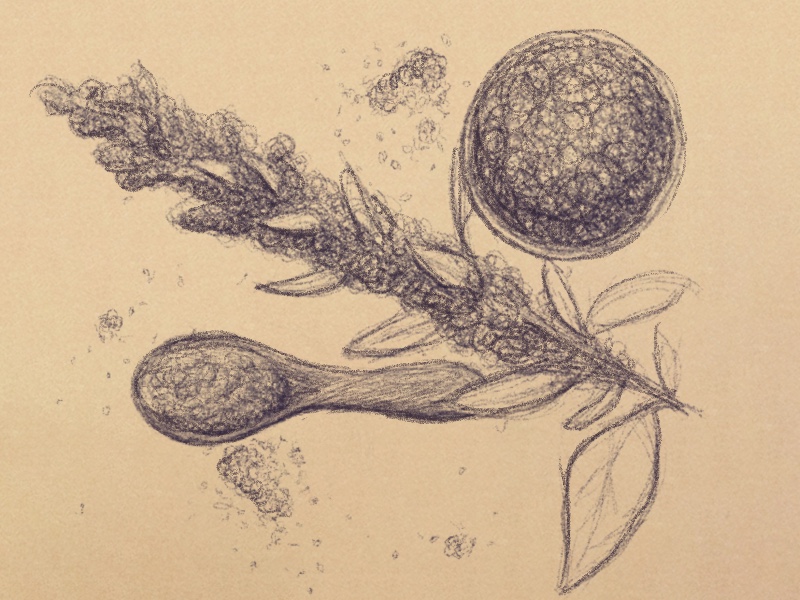By: Lalla Maiga
Indigenous peoples for centuries have been displaced of their lands and resources. The pattern continues today, with the traditional origins of quinoa being suppressed by recent developments in mapping the quinoa genome.

Credits: Illustration by Kit Chokly.
In this light, Fabiana Li, an anthropologist and assistant professor at the University of Manitoba, undertook an ethnographic study at the World Quinoa Congress to explore how this conference contributes to the power dynamics of how knowledge about quinoa is reproduced and preserved. At the 2021 Food Matters and Materialities conference, she exposed how quinoa has become a site of contention between traditional (and Indigenous) and Western understandings of the grain.
Quinoa is hailed as the healthy “superfood” that can feed the world. With the growing demand for quinoa as a potential crop to eradicate world hunger, scientists and researchers around the world have developed ways to cherry-pick or alter the genetic structure of a crop. If you want to rid a crop of a disease or improve the production yield of quinoa, genome mapping allows you to do so. The quinoa genome is suitable for genome mapping because quinoa seeds have desirable traits that will enable them to grow in cold weather, droughts and soils saturated with salt. As Mark Tester, professor at King Abdullah University of Science and Technology (KAUST) in Saudi Arabia and leader of the international quinoa genome mapping team, puts it: “Quinoa is an amazing plant. It could grow beautifully in very difficult environments.”
For Li, what is not addressed in these praises and research innovations in mapping the quinoa gene, is who really benefits from this knowledge? For the first time at the Congress, a special ‘Ancestral Knowledge’ session was held at the 2019 World Quinoa Congress in Chile. The session was held to celebrate the importance of quinoa to Indigenous ways of life with Mapuche and Ayamara elders sharing generational knowledge about farming, from crop rotation, a system they call aynoka, to identifying key events in the agricultural cycle. Elena, an Aymara elder sang to the conference participants, “Do not take my seed away, leave my seed alone.” Elena was signalling to conference participants and to the world that the globalization of the quinoa seed threatens Indigenous peoples’ lives and survival. Li focused on sharing Elena’s words to reveal how quinoa is deeply connected to its roots in South America. Quinoa consumption is a traditional practice and expression of cultural identity for the Mapuche and Aymara Indigenous communities located in modern-day Peru, Chile, Bolivia, Ecuador, and Argentina. It is an essential aspect of the connection between people and land. And yet, while this session was hosted for the first time in this Congress to recognize the importance of the grain for Indigenous people and communities, other sessions at this global scientific Congress avoided talking about who benefits from the sharing of genetic knowledge and material and who doesn’t.
Indeed, the inclusion of this session at the World Quinoa Congress calls attention to the tension between Western science and ancestral knowledge. The Congress lives within the context of Western science, which privileges observations and predictions which are tested to provide truths about the world. It contrasts to ancestral knowledge, which has existed for centuries, building on the generations of lived experiences of indigenous peoples. For Li, the introduction of the Ancestral Knowledge session at the World Quinoa Congress is an example of how Western science has continuously dominated over ancestral knowledge. On the one hand, the Mapuche and Ayamara leaders speaking in a session solely dedicated to ancestral knowledge grants legitimacy to Indigenous forms of knowledge. On the other hand, as a session providing separate knowledge from the Congress that focuses on sharing quinoa’s scientific information, it also emphasizes there is a clear division between traditional (and Indigenous) and Western understandings.
Li’s presentation on her observations at the sixth installation of the World Quinoa Congress highlighted some of the unsavoury truths about the impact of globalization on indigenous communities. The transformation of quinoa into a solution in the fight against food insecurity can result in socially destructive relationships with indigenous communities who may not benefit from the sharing of genetic material knowledge for their cultivation. We must be aware that we should not deprive indigenous communities of their seed, “which is like a gold gem for my heart,” sings Elena. Li says that we must ensure a reciprocal exchange of knowledge and genetic material with South American indigenous communities to ensure we all can benefit.